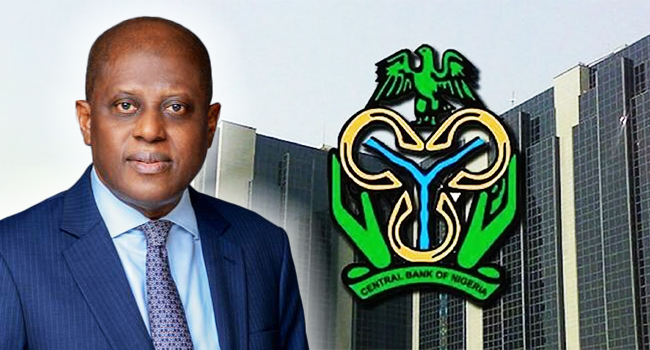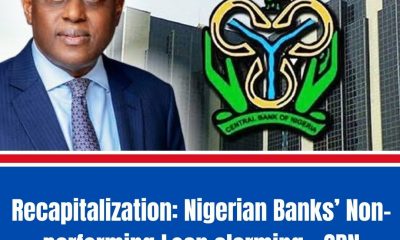Business
CBN hikes BDC license to N2bn, issues new guidelines on FX transactions [FULL LIST]

The Central Bank of Nigeria has issued new guidelines on the sale of Foreign Exchange by Bureau de Change Operators in the Country.
This development is part of massive reforms across the financial sector in Nigeria in order to remedy the massive Economic crisis the country is currently facing. In a statemnt on Friday titled; “‘Revised Regulatory and Supervisory Guidelines for Bureau De Change Operations in Nigeria’, the Financial Policy and Regulation Department of the CBN headed by Haruna B Mustafa detailed what is now expected of BDCs in Nigeria.
- Capital Requirements
The newly introduced guidelines categorize BDCs into two tiers with varying capital requirements. Tier 1 BDCs are now mandated to maintain a minimum capital requirement of N2 billion, while Tier 2 BDCs must adhere to a capital threshold of N500 million.
Previously, a minimum capital requirement from N35 million was set for all BDCs.
- Banks, NGOs, Government Agencies are barred from owning or Operating BDCs
According to the Circular, Various Categories of financial institutions are prohibited from holding ownership stakes in Bureau De Change (BDCs), either directly or indirectly.
This includes commercial banks, merchant banks, non-interest banks, and payment service banks. Additionally, other financial institutions (OFIs), such as holding companies and payment service providers, are also barred from owning BDCs.
Furthermore, ineligible entities encompass non-governmental organizations (NGOs), employees of financial regulatory and supervisory agencies, government entities at all levels, public officials, and cooperative societies, among others.
- BDCs are barred from dealing in Gold, taking Deposits
Bureau De Change (BDCs) are authorized to engage in specific activities outlined by the Central Bank of Nigeria (CBN), including the buying and selling of foreign currencies, issuing prepaid cards, and serving as cash points for money transfer operators.
However, they are prohibited from accepting deposits, extending loans, trading in gold, or participating in capital market activities. Furthermore, CBN said BDC operators can not engage in street trading, maintenance of any type of account for the public, and opening or maintaining any account with any financial institution outside Nigeria.
They are also banned by the CBN from engaging in offshore business, financing political activities, selling FX on credit to customers and granting loans, as well as international inward transfers (except for operators that serve as cash-out points for International Money Transfer Operators).
- Sourcing/Sale of FOREX
BDCs are permitted to source forex from authorized dealers, travelers, hotels, embassies, and other approved channels as specified by the new regulatory guidelines.
Regarding the sale of foreign currencies, BDCs can sell forex for purposes such as travel, medical bills, and school fees, up to specified limits per customer annually.
They can also sell for the repurchase of unused naira from a non-resident from whom the BDC had sourced foreign currency in the course of the visit.
- 75% of Transactions must be through Electronic Channels
At least 75 percent of the sales must be conducted through electronic transfers, while the remaining 25 percent can be in cash.
A beneficiary of BTA or PTA shall receive up to 25 percent of the foreign currency in cash, according to the CBN, and the remaining 75 percent shall be transferred to the customer electronically (to the customer’s Nigerian domiciliary account or prepaid card).
- Customers with $10,000 and above must declare Source of FX
The Central Bank of Nigeria (CBN) has stipulated that individuals or entities selling the equivalent of $10,000 or more to Bureau De Change (BDCs) must disclose the source of the foreign exchange and adhere to all Anti-Money Laundering/Combating the Financing of Terrorism/Counter Proliferation Financing (AML/CFT/CPF) regulations, as well as foreign exchange laws and regulations.
READ ALSO: NSA’s office, CBN join forces to hunt down Forex speculators, economic saboteurs
Customers are permitted to transfer foreign currencies from their personal domiciliary accounts held with Nigerian banks to BDCs.
All digital or transfer transactions for purchasing foreign currencies will be credited to the BDC’s Nigerian domiciliary account, with payments made to customers’ Naira accounts. For non-resident customers, whether Nigerian or foreign, a BDC may issue prepaid NGN cards, subject to relevant maximum credit and cumulative limits in accordance with Know Your Customer (KYC) requirements.
In the case of non-resident customers, BDCs are instructed to issue prepaid Naira cards, subject to applicable maximum credit and cumulative limits as per KYC requirements.
Beneficiaries of BTA or PTA of $500 or less can receive the forex in cash. In the same vein, the financial regulator said payments to customers for cash purchases of forex of the equivalent of $500 and below may be made in cash.












